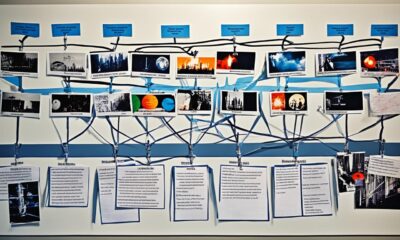Understanding Narcissism
Understanding a Narcissistic Personality
Start unraveling the complexities of a Narcissistic Personality to uncover hidden truths and strategies for managing relationships.

Understanding a narcissistic personality involves recognizing traits like an exaggerated sense of importance, the need for admiration, lack of empathy, entitlement, and manipulative tendencies. These traits often stem from a combination of genetic predispositions, inherited characteristics, and early life experiences. Different types of narcissistic personalities may exhibit varying behaviors and motivations. Recognizing patterns of manipulation, lack of empathy, and exploitation is essential in managing relationships with narcissists. Strategies like assertive communication, setting clear boundaries, seeking support, and understanding vulnerabilities can help navigate interactions with narcissistic individuals effectively. Further insights into coping mechanisms and psychological dynamics await.
Key Takeaways
- Exaggerated self-importance and need for admiration.
- Lack of empathy towards others.
- Sense of entitlement and manipulative tendencies.
- Genetic predispositions and early experiences influence development.
- Various behaviors and motivations characterize different types of narcissistic personalities.
What Is Narcissism?
Narcissism manifests as an exaggerated sense of self-importance and an insatiable need for admiration. This personality trait is marked by behaviors such as seeking constant validation, lacking empathy towards others, and displaying a sense of entitlement. Individuals with narcissistic traits often exhibit manipulative tendencies, exploiting others for personal gain without regard for the well-being of those around them.
Their behavior can be characterized by a pattern of grandiosity, a need for excessive admiration, and a tendency to belittle or look down upon others. These traits can greatly impact relationships, work dynamics, and overall emotional well-being. Recognizing these behaviors is essential in managing interactions with individuals who exhibit narcissistic characteristics.
Origins of Narcissistic Traits

As we explore the roots of narcissistic traits, it becomes evident that genetic predispositions and early childhood experiences greatly influence the development of these characteristics. When delving into the origins of narcissistic traits, several key points emerge:
- Inherited Characteristics: Genetic factors play a significant role in shaping narcissistic traits, as evidenced by twin studies showing a 64% correlation in behavior.
- Lack of Empathy: Early parenting issues can hinder the development of empathy in individuals prone to narcissistic traits, leading to difficulties in understanding and relating to others.
- Struggles with Self-Worth: Narcissists often struggle with feelings of inferiority and shame, oscillating between self-inflation and self-loathing.
- Seek Treatment: It's essential for individuals exhibiting narcissistic traits to seek treatment and therapy to address underlying issues and learn healthier coping mechanisms.
Understanding the interplay between genetic predispositions and early experiences is essential in comprehending the origins of narcissistic traits and the importance of seeking appropriate treatment for individuals struggling with these characteristics.
Characteristics of Narcissistic Behavior

Exhibiting a grandiose sense of self-importance, individuals with narcissistic traits often present exaggerated views of their personal achievements. This behavior is a vital characteristic of narcissistic personality disorder.
They harbor fantasies of power, success, or idealized love, seeking excessive admiration and special treatment to validate their self-worth. Empathy is lacking in narcissists, leading them to exploit others without guilt or remorse, viewing people as tools for personal gain.
Envy towards others fuels their arrogance, believing they're entitled to special privileges. Understanding these behaviors can shed light on the complexities of narcissistic personalities. It's essential to recognize these traits to navigate relationships effectively and protect oneself from potential harm.
Types of Narcissistic Personalities

Moving on from the characteristics of narcissistic behavior, a deeper understanding can be gained by exploring the various types of narcissistic personalities that manifest distinct traits and behaviors. When delving into the domain of narcissism, it becomes evident that individuals with this personality trait can exhibit a range of behaviors and motivations.
Here are some common types of narcissistic personalities:
- Exhibitionist Narcissists: These individuals showcase grandiosity and a lack of empathy, constantly seeking admiration from others.
- Closet Narcissists: Struggling with feelings of inadequacy and inner emptiness, they hide their true self-perception behind a facade.
- Malignant Narcissists: Displaying hostile and antisocial behaviors, they may cause harm to those around them without remorse.
- Genetic Predisposition: It's worth noting that genetic factors may play a role in the development of narcissistic personalities, influencing how these traits manifest in individuals.
Understanding these different types of narcissistic personalities can offer insights into the complexities of relationships with a narcissist.
Recognizing Narcissistic Patterns

Recognizing narcissistic patterns involves being alert to behavior red flags, manipulative tactics, and a lack of empathy.
These individuals often exhibit a grandiose sense of self-importance and exploit others for personal gain, lacking the ability to take into account others' feelings.
Behavior Red Flags
In identifying narcissistic patterns, it's vital to observe for behavior red flags that signal a grandiose self-image and exploitative tendencies. Some signs of narcissism include:
- A grandiose sense of self-importance and superiority over others.
- Constant need for admiration and validation to support their inflated self-image.
- Exploitative tendencies to manipulate and take advantage of others for personal gain.
- Lack of empathy towards others' feelings and needs, prioritizing their own desires.
Recognizing these behaviors can help in identifying individuals with narcissistic personality disorder. It's essential to remain vigilant for these red flags as they often indicate deeper issues related to lack of empathy and an excessive need for validation and control.
Manipulative Tactics
Gaslighting is a common manipulative tactic employed by narcissists to sow doubt in their targets' reality and perceptions. This insidious technique involves the narcissist denying events or occurrences, making the victim question their memory and sanity.
Love bombing is another tactic where the narcissist overwhelms their target with excessive affection and attention in the initial stages of a relationship. This flood of positive reinforcement is designed to create dependency and control.
Triangulation is a manipulation strategy where the narcissist introduces a third party into the relationship to incite jealousy or competition, further asserting dominance.
Lack of Empathy
Understanding the lack of empathy in narcissistic individuals sheds light on their self-centered nature and disregard for the emotions of others. This lack of empathy, a hallmark of narcissistic personality disorder, results in an inability to comprehend or empathize with the feelings of those around them.
Here are key points to keep in mind:
- Disregard for others' emotions and needs
- Tendency to exploit and manipulate without remorse
- Prioritization of personal desires over the well-being of others
- Difficulty forming genuine connections and maintaining healthy relationships
These individuals may use their lack of empathy to their advantage, furthering their own agenda at the expense of others. Recognizing these patterns is important in dealing with interactions with individuals exhibiting narcissistic traits.
Impact on Relationships

Narcissistic individuals can have a significant impact on relationships due to their self-centered behavior and emotional manipulation tactics. Partners may experience difficulty in establishing genuine connections and maintaining healthy dynamics with narcissists.
Setting boundaries and managing their need for control are vital strategies when dealing with relationships with individuals exhibiting narcissistic traits.
Relationship Dynamics
Relationships with individuals displaying narcissistic personalities often involve emotional manipulation and exploitation for personal gain. It can be challenging to navigate these dynamics, but understanding how narcissists operate in relationships can help individuals protect themselves. Here are some key points to bear in mind:
- Emotional Manipulation: Narcissists often use emotional manipulation tactics to control and dominate their partners.
- Exploitation: They may exploit their partner's vulnerabilities for their benefit without considering the other person's feelings.
- Lack of Boundaries: Narcissists struggle to respect boundaries, making it essential for partners to establish and maintain clear boundaries for self-preservation.
- Communication Challenges: Communication with a narcissistic individual can be strained due to their lack of empathy, leading to misunderstandings and conflicts.
Emotional Manipulation
In relationships with individuals who display narcissistic personalities, the impact of emotional manipulation is significant and can greatly affect the dynamics between partners. Emotional manipulation by those with narcissistic personality disorder often leads to strained communication, creating a barrier to genuine connection.
These individuals exploit others for personal gain using manipulative tactics, causing emotional distress and insecurity in their partners. To safeguard mental health, it's important to recognize and avoid triggers of emotional manipulation in these relationships.
Understanding the effects of emotional manipulation is essential for setting boundaries and seeking support when dealing with narcissistic personalities. By being aware of these dynamics, individuals can navigate such relationships with greater clarity and protect their well-being.
Coping Strategies for Dealing With Narcissists

To effectively deal with narcissists, it's essential to establish and maintain clear boundaries that safeguard our emotional well-being. When dealing with individuals exhibiting personality disorders, antisocial behavior, and a sense of self-importance, it's important to employ strategic coping mechanisms. Here are some practical strategies for managing interactions with narcissists:
- Communicate assertively: Clearly express your needs and establish realistic expectations to reduce conflicts.
- Avoid power struggles: Refrain from engaging in battles for control and concentrate on prioritizing self-care.
- Seek support: Turn to trusted friends or a therapist for guidance and assistance in handling challenging interactions.
- Practice self-awareness: Develop techniques for emotional regulation to prevent manipulation by narcissistic individuals.
Setting Boundaries With Narcissistic Individuals

Establishing firm boundaries with narcissistic individuals is essential for safeguarding our emotional well-being and preventing manipulation. When dealing with individuals with Narcissistic Personality Disorder (NPD), setting clear limits is vital to protect ourselves from exploitation and maintain a sense of control in the relationship. It is important to communicate our boundaries clearly and consistently to establish a framework of expectations and self-respect. Narcissists may attempt to challenge or ignore these boundaries, requiring us to be firm and unwavering in enforcing them. Here is a table outlining key strategies for setting boundaries with narcissistic individuals:
| Key Strategies for Setting Boundaries |
|---|
| Clearly communicate limits and expectations |
| Consistently reinforce boundaries |
| Be firm and consistent in enforcing boundaries |
| Recognize and resist manipulation tactics |
| Maintain a sense of self-respect and autonomy |
Seeking Support for Narcissistic Relationships

When managing relationships with narcissistic individuals, it's important to remember that support is readily available to help us cope and heal.
From therapy sessions that guide us in setting healthy boundaries to online communities offering shared experiences, there are various resources to lean on.
Seeking professional guidance and practicing self-care are essential steps in understanding and managing narcissistic relationships.
Supportive Resources Available
Support groups and therapy services serve as valuable resources for individuals managing relationships with narcissists, offering essential guidance and coping tools. When dealing with a narcissistic personality disorder, seeking support is essential. Here are some supportive resources available:
- Support groups provide guidance and validation.
- Therapy and counseling services offer tools to cope with challenges.
- Online resources and forums offer a sense of community and shared experiences.
- Seeking advice from mental health professionals can assist in developing effective strategies.
These resources can help individuals navigate the complexities of narcissistic relationships, empowering them to set boundaries and prioritize their well-being.
Professional Therapy Options
Professional therapy options for individuals managing narcissistic relationships often incorporate cognitive behavioral therapy (CBT) to address maladaptive behaviors and thought patterns. CBT is effective in challenging distorted thinking and promoting healthier responses.
Additionally, Dialectical behavior therapy (DBT) may be utilized to enhance emotional regulation and interpersonal skills, essential for those with narcissistic traits. Schema therapy targets core beliefs and behaviors, aiding in lasting change.
Group therapy offers a supportive setting for exploring and improving interpersonal challenges. Seeking treatment from a qualified therapist experienced in addressing narcissistic dynamics can greatly help in managing relationship difficulties.
These therapies aim to empower individuals to develop healthier coping mechanisms and foster more positive interactions in their relationships.
Online Support Communities
Have you ever wondered how online support communities can provide a safe space for individuals dealing with narcissistic relationships?
Online support communities offer a sanctuary for those affected by narcissistic personality disorder to connect, share experiences, and gain insights into coping strategies. Here are some key ways these communities can be beneficial:
- Emotional support and validation are readily available.
- Members can access resources and information to understand narcissistic behavior.
- Coping strategies are shared to help navigate relationships with narcissistic individuals.
- Peer support aids in reducing feelings of isolation and empowers individuals to prioritize self-care and set boundaries.
Participating in these communities can foster healing, growth, and recovery from the emotional turmoil caused by narcissistic relationships.
Understanding Narcissistic Vulnerabilities

Narcissistic vulnerabilities, often rooted in childhood neglect or abuse, manifest in individuals through a delicate balance of inferiority and superiority feelings. These vulnerabilities create a fragile self-image that individuals with narcissistic traits struggle to protect. Hypersensitivity to criticism arises as a defense mechanism against their deep-seated insecurities, leading to intense reactions to perceived slights. The alternating feelings of superiority and inferiority create a complex inner world where individuals with narcissistic vulnerabilities constantly seek external validation to counter feelings of inadequacy.
Understanding these vulnerabilities is essential in therapeutic interventions aimed at addressing narcissistic behaviors. By recognizing the fragility beneath the facade of grandiosity, therapists can help individuals explore the roots of their insecurities and develop healthier coping mechanisms. It's vital to approach individuals with narcissistic vulnerabilities with empathy and patience, acknowledging their inner struggles while encouraging introspection and growth. Through targeted interventions, individuals can begin to unravel the layers of their vulnerabilities and work towards a more balanced sense of self.
Frequently Asked Questions
How Do Narcissists Treat Their Partners?
Narcissists treat their partners with emotional manipulation and control tactics. They employ gaslighting to make their partners doubt reality and invalidate their feelings.
Love bombing at the start may shift to devaluation and belittlement phases. Constant criticism, blame-shifting, and isolation are common experiences for partners.
This emotional abuse can lead to anxiety, depression, and questioning of self-worth. Recognizing these behaviors and seeking support are crucial to protect oneself.
How Do You Disarm a Narcissist?
To disarm a narcissist, we must set clear boundaries and avoid power struggles. Assertiveness and calm demeanor help us stand strong against manipulation.
Seek support from friends, family, or a therapist for guidance. Remember, 'The best defense is a good offense' when dealing with narcissists.
Stay confident and composed to protect your well-being and navigate interactions effectively.
How Do You Make a Narcissist Realize They Are Wrong?
To make a narcissist realize they're wrong, we suggest calmly presenting clear evidence and examples of their behavior. Using a non-confrontational approach, offer feedback that encourages reflection and self-awareness.
It's important to avoid personal attacks and instead focus on the specific actions that are problematic. Suggesting professional therapy to explore underlying issues may also help in fostering a deeper understanding of their behavior.
Who Can Tolerate a Narcissist?
We, as individuals with strong boundaries and emotional resilience, can often tolerate a narcissist's behavior. Understanding their traits and behaviors equips us to navigate interactions effectively.
A robust support system and access to therapy further bolster our ability to handle their tendencies. Prioritizing our mental health helps us withstand the challenges of being around a narcissist.
Conclusion
Understanding a narcissistic personality can be challenging, but by recognizing the traits and patterns, setting boundaries, seeking support, and understanding their vulnerabilities, we can navigate these relationships more effectively.
It's like walking a tightrope, balancing between self-preservation and compassion. By staying informed and prepared, we can handle the ups and downs of interacting with narcissistic individuals with grace and resilience.
Stay strong, stay informed, and remember to prioritize your own well-being.
Chris brings a wealth of knowledge and personal experience to the role of Expert Author. With a focus on narcissistic personality disorder and recovery processes, Chris’s articles offer a mix of expert analysis, personal anecdotes, and actionable advice. Their work enriches our platform with depth, authenticity, and a perspective that resonates with those who have experienced narcissism firsthand.
Covert Narcissist
What Makes a Covert Narcissist Different from an Avoidant?
Analyze the intricate behaviors of a covert narcissist or avoidant individual, unraveling the fine line between self-absorption and emotional distance.

The saying ‘actions speak louder than words’ is particularly relevant when differentiating between a covert narcissist and someone with avoidant tendencies within the realm of character traits. The specific behaviors exhibited by individuals with these personality types often cause uncertainty regarding their true motivations and intricate emotions.
As we navigate through the intricate web of characteristics and relational patterns associated with these traits, a deeper understanding of the driving forces behind each persona unveils a fascinating journey into the complexities of human behavior.
Key Takeaways
- Covert narcissists manipulate through gaslighting, lack empathy, and have fragile self-esteem.
- Avoidant individuals fear rejection, struggle with intimacy, and have difficulty expressing emotions.
- Differentiate between covert narcissists and avoidant individuals to navigate relationships effectively.
- Setting boundaries and practicing self-care are crucial in managing interactions with these individuals.
Understanding Covert Narcissistic Behaviors
In understanding covert narcissistic behaviors, it's crucial to recognize the subtle manipulation tactics employed by individuals who exhibit this personality trait. Covert narcissists often display an avoidant attachment style characterized by a strong need for admiration and a lack of empathy towards others. This attachment style stems from underlying feelings of inadequacy and a fragile self-esteem, leading them to seek validation through controlling and manipulating others.
Individuals with covert narcissism may use tactics such as gaslighting, where they distort reality to make their victims doubt their own perceptions and memories. By eroding their victim's sense of reality, covert narcissists gain power and control over them. This manipulation is a key feature of their narcissistic behavior, allowing them to maintain a facade of superiority and self-importance.
Understanding the interplay between avoidant attachment styles and narcissism is crucial in identifying and dealing with covert narcissistic behaviors. By recognizing these subtle manipulation tactics, individuals can better protect themselves from falling victim to the harmful effects of covert narcissists.
Signs of Avoidant Personality Traits

Having understood the manipulation tactics of covert narcissists, it's imperative to recognize the signs of avoidant personality traits that often accompany such behaviors. Avoidant individuals may exhibit the following characteristics:
- Avoidance of intimacy and emotional closeness in relationships.
- Fear of rejection and low self-esteem leading to social withdrawal.
- Difficulty expressing emotions and reluctance to seek help or support.
- Preferring solitary activities and avoiding social interactions.
These traits can stem from various factors, including childhood attachment patterns. Individuals with avoidant attachment styles may struggle with forming secure emotional connections due to past experiences. This can lead to a tendency to withdraw from relationships to protect themselves from perceived rejection or vulnerability.
Understanding these signs can help differentiate between covert narcissistic behaviors and avoidant personality traits, shedding light on the complexities of interpersonal dynamics. Furthermore, recognizing these patterns can aid in addressing underlying issues and fostering healthier relationships.
Impact on Relationships
The impact of avoidant personality traits on relationships can manifest in various ways, affecting both individuals involved. Avoidant individuals often struggle with forming secure attachments, which can lead to challenges in establishing and maintaining healthy adult relationships. Let's delve into the specific impacts on relationships through the table below:
| Impact on Relationships | Description |
|---|---|
| Difficulty with Intimacy | Avoidants may have difficulty opening up emotionally, leading to a lack of intimacy in relationships. |
| Fear of Rejection | Due to their fear of rejection, avoidant individuals may push partners away or avoid commitment altogether. |
| Communication Issues | Avoidants often struggle with effective communication, leading to misunderstandings and conflicts in relationships. |
Understanding these impacts is crucial in navigating relationships with individuals exhibiting avoidant traits. It's important to differentiate between avoidant behaviors and narcissistic personality disorder, as the underlying motivations and dynamics in relationships can vary significantly.
Differentiating Covert Narcissists and Avoidant Individuals

Upon examining the distinct characteristics of covert narcissists and avoidant individuals in relationships, it becomes evident that their behaviors and underlying motivations diverge significantly. When differentiating between covert narcissists and avoidant individuals, several key points emerge:
- Covert narcissists excel at masking their true intentions, seeking admiration and control, while avoidant individuals are more inclined to shun intimacy due to fear of rejection.
- Covert narcissists often employ false humility to garner trust and sympathy, whereas avoidant individuals may struggle with self-esteem and play down their accomplishments.
- Covert narcissists actively seek attention and manipulate situations to be the center of focus, while avoidant individuals prefer to evade attention and remain in the background.
- Covert narcissism is characterized by an unquenchable thirst for admiration and a tendency towards manipulation, whereas avoidant individuals harbor a deep-rooted dread of rejection and encounter difficulties in establishing intimate connections.
Understanding these distinctions can aid in recognizing and navigating relationships with individuals who exhibit traits of either covert narcissism or avoidance.
Coping Strategies and Setting Boundaries
To effectively navigate relationships with individuals displaying traits of covert narcissism or avoidance, implementing and maintaining clear boundaries is essential. When dealing with covert narcissists or avoidant individuals, establishing boundaries helps protect against manipulation and emotional harm.
It's crucial to clearly communicate your limits and expectations to maintain a healthy dynamic. Additionally, practicing coping strategies such as self-care, assertiveness, and seeking support from trusted individuals like friends, family, or therapists can aid in managing interactions with these personality types.
Prioritizing self-care activities that bring joy and fulfillment can help in maintaining emotional well-being. Learning to assertively express needs and feelings without fear of manipulation is key in setting boundaries with covert narcissists or avoidant individuals.
Limiting contact with these individuals when possible can also safeguard emotional health and reinforce boundaries. By incorporating these coping strategies and setting clear boundaries, one can navigate relationships with covert narcissists or avoidant individuals more effectively.
Frequently Asked Questions
Am I Avoidant or Narcissist?
We often question our behavior and tendencies, wondering if we fall into certain psychological categories. It's natural to reflect on our actions and personalities, seeking to understand ourselves better.
Identifying whether we exhibit avoidant or narcissistic traits can provide insight into our emotional patterns and relationships. Self-awareness is a key step in personal growth and development, allowing us to address areas where we may need to make positive changes.
What Can Be Mistaken for Covert Narcissism?
When examining behaviors that can be confused with covert narcissism, it's crucial to consider traits like introversion, shyness, or social anxiety. These characteristics may manifest similarly to covert narcissistic tendencies, such as avoiding social interactions or seeking validation through subtle means.
Understanding the nuances between these traits is essential in accurately identifying covert narcissism and differentiating it from other personality traits or disorders.
What Are the Red Flags of a Covert Narcissist?
When assessing potential red flags of covert narcissism, observing patterns of behavior is crucial. Look for signs of manipulation, lack of empathy, grandiosity, and a constant need for admiration.
Pay attention to how they interact with others, especially in social settings or when faced with criticism. Keep an eye out for subtle but persistent displays of entitlement and a tendency to exploit others for personal gain.
These behaviors can indicate underlying narcissistic traits.
What Hurts a Covert Narcissist the Most?
Criticism or rejection can deeply wound individuals who seek external validation, control, and admiration.
Failure to manipulate or threats to their grandiose fantasies can also trigger intense hurt.
Such individuals may struggle with feelings of inferiority, invisibility, and a fragile self-image.
Understanding these vulnerabilities can shed light on what truly affects them at their core.
Is the Behavior of a Covert Narcissist Related to Their Constant Illness?
The covert narcissist’s constant sickness may be a manipulation tactic to garner sympathy and attention. By portraying themselves as perpetually unwell, they seek to control others’ perceptions and elicit constant care and attention. This behavior aligns with their need for admiration and validation, perpetuating their narcissistic traits.
Conclusion
In conclusion, navigating relationships with individuals exhibiting covert narcissistic behaviors or avoidant attachment can be challenging. It's like walking a tightrope, balancing between their need for validation and fear of intimacy.
Setting boundaries and practicing self-care are crucial in maintaining healthy interactions with these personality types. Remember, understanding their underlying motivations can help in managing expectations and protecting your emotional well-being.
Chris brings a wealth of knowledge and personal experience to the role of Expert Author. With a focus on narcissistic personality disorder and recovery processes, Chris’s articles offer a mix of expert analysis, personal anecdotes, and actionable advice. Their work enriches our platform with depth, authenticity, and a perspective that resonates with those who have experienced narcissism firsthand.
Narcissism Test
Discover Your Inner Narcissist: You Quiz
Intrigued to uncover hidden traits? Take the 'How Narcissist Are You Quiz' and delve into the spectrum of narcissistic tendencies.

Have you ever thought about how self-awareness can shed light on different aspects of our personalities in our everyday interactions? Do you ever wonder how your level of self-reflection compares to that of others?
The 'How Narcissist Are You Quiz' unveils a spectrum of narcissistic tendencies that might surprise you. Let's explore how this quiz can offer a glimpse into our psyche and potentially challenge our perceptions of self-image.
Key Takeaways
- Online quizzes are not diagnostic tools for narcissistic personality disorder.
- Self-reflection allows introspection and analysis of actions, thoughts, and emotions.
- Analyzing conduct provides valuable insights and fosters healthier relationships.
- Seek guidance from mental health professionals for understanding and addressing tendencies.
Understanding Narcissism Through a Quiz
Exploring narcissism through a quiz can provide insights into the traits associated with narcissistic personality disorder. Narcissistic traits such as grandiosity, lack of empathy, and manipulation are often fundamental aspects of this disorder. By engaging with a narcissism quiz, individuals may gain a better understanding of these characteristics and how they manifest in their own behavior.
While such quizzes can serve as a preliminary screening tool, it's essential to recognize their limitations. Online quizzes aren't diagnostic tools and shouldn't be solely relied upon for a definitive diagnosis of narcissistic personality disorder. Instead, they can prompt individuals to reflect on their behaviors and seek further evaluation from mental health professionals if necessary.
To truly comprehend the complexities of narcissistic personality disorder, one must undergo a comprehensive assessment by a qualified specialist. Seeking professional help is crucial for an accurate diagnosis and the development of an appropriate treatment plan tailored to the individual's specific needs and circumstances.
Self-Reflection on Narcissistic Behaviors

After considering the limitations of online quizzes in diagnosing narcissistic personality disorder, it becomes imperative to engage in self-reflection on our own behaviors that may align with narcissistic traits. Self-reflection allows us to introspect and analyze our actions, thoughts, and emotions for signs of narcissistic tendencies. To aid in this process, a structured approach can be helpful. The table below outlines key behaviors associated with narcissistic personality disorder for self-assessment:
| Narcissistic Behavior | Description | Self-Reflection |
|---|---|---|
| Grandiosity | Exaggerated sense of self-importance | Have I displayed an inflated ego? |
| Lack of Empathy | Difficulty understanding others' feelings | Have I been insensitive to others' emotions? |
| Need for Admiration | Constant seeking of praise and admiration | Do I constantly seek validation from others? |
| Sense of Entitlement | Belief in special treatment and privileges | Have I expected special treatment in situations? |
Analyzing our conduct through this lens can provide valuable insights into our personalities and help in fostering healthier relationships.
Exploring Narcissistic Tendencies Together
Together, we'll delve into the manifestations of narcissistic tendencies within interpersonal relationships to enhance our understanding and foster a supportive environment for growth.
When exploring narcissistic behaviors in relationships, it's crucial to distinguish between normal self-interest and the traits associated with Narcissistic Personality Disorder (NPD). Individuals with NPD often exhibit a grandiose sense of self-importance, a constant need for admiration, and a lack of empathy for others. These characteristics can significantly impact how they interact with those around them, leading to strained relationships and emotional distress for both parties involved.
In today's digital age, social media platforms can amplify narcissistic tendencies, providing individuals with NPD a stage to seek validation and attention on a broader scale. The instant gratification and validation received through likes, comments, and followers can fuel their narcissistic traits, reinforcing their belief in their superiority and entitlement.
Assessing Your Narcissistic Traits

Within interpersonal relationships, understanding and recognizing one's narcissistic traits is essential for fostering personal growth and maintaining healthy dynamics. When assessing your narcissistic tendencies, it's crucial to approach the evaluation with a reflective and open mindset. Here are some key points to consider:
- Causes of Narcissistic Personality: Delve into the root causes that may have contributed to the development of narcissistic traits, such as childhood experiences or past relationships.
- Consulting a Mental Health Professional: Seeking guidance from a mental health professional can provide valuable insights and support in understanding and addressing narcissistic tendencies.
- Inflated Sense of Self-Importance: Reflect on instances where you may have exhibited an inflated sense of self-importance or a constant need for admiration from others.
- Impact on Interpersonal Relationships: Evaluate how your narcissistic traits impact your relationships with others and consider the feedback you receive from those around you.
- Self-Reflection and Growth: Engage in self-reflection to identify areas for personal growth and work towards cultivating healthier relationship dynamics.
Insights Into Your Personality: The Narcissism Quiz
The Narcissism Quiz provides a structured assessment tool to evaluate narcissistic behaviors and offer insights into one's personality. By answering a series of multiple-choice questions that reflect narcissistic tendencies, individuals can gain a better understanding of their own behavior patterns.
This quiz isn't a diagnostic tool for Narcissistic Personality Disorder (NPD) but can help determine whether certain traits align with narcissistic characteristics inspired by Greek mythology.
The results of the quiz are anonymous, allowing participants to reflect on their responses without fear of judgment. It's essential to approach the findings with an open mind and consider seeking guidance from a mental health professional if concerns about narcissistic traits arise.
Frequently Asked Questions
How Do You Check if You Are a Narcissist?
We assess narcissistic tendencies by reflecting on our behaviors, thoughts, and interactions with others. Observing how we prioritize our own needs over those of others, seek excessive admiration, or lack empathy can provide insights.
Engaging in self-reflection, seeking feedback from trusted individuals, and considering professional evaluation are valuable steps in evaluating potential narcissistic traits.
Awareness and willingness to address these aspects can be crucial for personal growth and healthier relationships.
What Is the One Question to Identify a Narcissist?
We can identify a potential narcissist by asking if they believe they're more special or unique than others. A resounding 'yes' to this question may indicate narcissistic tendencies.
It's important to distinguish between healthy self-esteem and exaggerated self-importance. However, this question alone isn't a definitive diagnosis of narcissistic personality disorder.
Seeking a professional evaluation from a mental health expert is crucial for an accurate assessment.
What Words Can Destroy a Narcissist?
We've explored how criticism, rejection, ignoring, accountability, and empathy can deeply affect a narcissist. These words have the power to pierce through their facade of superiority and self-centeredness, challenging their fragile ego and sense of self-worth. Understanding these triggers can help us navigate interactions with narcissistic individuals more effectively, promoting healthier relationships and boundaries.
It's crucial to approach such situations with empathy and caution, recognizing the complexities at play.
Can a Narcissist Cry Easily?
Yes, narcissists can cry, but it's typically not genuine. Their tears often serve a manipulative purpose, such as to elicit sympathy or control others. When they do cry, it's usually driven by self-pity or to further their own agenda.
These emotional displays are short-lived and quickly revert back to their self-centered focus.
It's essential to recognize that not all individuals who cry easily exhibit narcissistic traits, as crying is a normal and healthy response.
Conclusion
In conclusion, taking the 'How Narcissist Are You Quiz' can provide valuable insights into your level of narcissism.
It's important to remember that self-awareness is key to personal growth and building healthy relationships.
Just like a mirror reflecting our inner selves, this quiz serves as a tool to help us understand and address our behaviors.
Remember, seeking professional help is always recommended for accurate diagnosis and treatment.
Our Content Strategist, Jordan, has a knack for deciphering the digital landscape to determine what our audience seeks. With a foundation in behavioral science and digital marketing, Jordan crafts our content strategy, ensuring that our topics are relevant, research-based, and resonant. Their strategic approach helps Narcissistic Man reach hearts and minds across the globe.
Covert Narcissist
Unveiling the Covert Narcissist’s Final Discard Tactics
Beware the covert narcissist's final discard – uncover the unsettling aftermath and psychological implications that linger long after.

It might be surprising, but studies show that nearly 20% of individuals could encounter a covert narcissist during their lifetime.
The covert narcissist's final discard is a complex and often painful experience that can leave lasting emotional scars. Understanding the intricacies of this behavior can offer insight into the manipulation and psychological impact it can have on those involved.
Exploring the warning signs and aftermath of such a discard can shed light on the dynamics at play and provide a path to healing and recovery.
Key Takeaways
- Gradual withdrawal and manipulation are warning signs of covert narcissist discard.
- Emotional devastation and questioning of reality are common after covert narcissist discard.
- Focus on self-care, therapy, and setting boundaries for coping after covert narcissist discard.
- Seek professional help and surround yourself with a supportive network for healing from covert narcissist abandonment.
Warning Signs of Covert Narcissist Discard
During the discard phase, covert narcissists often gradually withdraw, decrease communication, and engage in subtle manipulative behaviors to undermine the victim's confidence.
Signs of a subtle covert narcissist discard can include setting unclear boundaries, invading personal space, and withholding emotional support.
As the fragile self-esteem of the victim becomes apparent, the covert narcissist may use manipulation tactics such as deflecting blame onto the victim. They may leave you feeling isolated and confused as the narcissist decides when to provide affection and when to withdraw it.
It's essential to recognize these warning signs early on to protect oneself from further emotional harm. By establishing and enforcing personal boundaries, individuals can begin to mitigate the damaging effects of a covert narcissist's discard phase.
Understanding these manipulation tactics is crucial in breaking free from the cycle of emotional abuse perpetuated by covert narcissists.
Emotional Impact of Final Discard

The emotional aftermath of being finally discarded by a covert narcissist can be overwhelmingly devastating, leaving individuals shattered and questioning their self-worth.
Covert narcissists wield power and control in relationships, manipulating emotions to serve their needs.
The discard phase is emotionally draining, as the partner realizes they were merely an object of attention that can be easily cast aside. This act of abandonment can shatter established boundaries, leaving the individual feeling used and disposable.
The covert narcissist's ability to manipulate your emotions can leave you feeling emotionally unstable and questioning your own reality.
The impact of narcissistic abuse can be profound, requiring extensive healing to regain a sense of self-worth and rebuild damaged self-esteem.
The final discard serves as a harsh awakening to the true nature of the covert narcissist, revealing the depth of manipulation and emotional turmoil endured throughout the relationship.
Coping Strategies After Narcissist's Discard
Navigating the aftermath of a covert narcissist's final discard involves implementing essential coping strategies to facilitate healing and reclaiming one's sense of self-worth. After experiencing a narcissist's discard, it's crucial to focus on self-care and prioritize well-being. Seeking therapy or counseling can help process emotions and heal from the trauma. Building a supportive network of friends and family who understand and validate your experiences is essential. Setting boundaries to protect oneself from further manipulation or abuse is key. Additionally, practicing self-compassion and reminding oneself that the discard wasn't their fault can aid in the healing process.
- Acknowledge that the narcissist's behavior is a result of their personality disorder, not your fault.
- Engage in self-reflection to recognize any contribution to the dysfunctional relationship.
- Consider the discard as an opportunity to heal and move on, rather than wanting the narcissist back.
- Implement no contact with the narcissist to aid in the healing process, despite potential hoovering attempts.
- Respond to the discard phase with self-respect, dignity, and a focus on your own well-being.
Recognizing Manipulation Before Discard

When detecting manipulation before a discard by a covert narcissist, it's crucial to pay close attention to subtle behavioral shifts and communication patterns. Recognizing the signs of emotional withdrawal, decreased communication, and the withholding of emotional support and affection can be key indicators of manipulation during the discard phase.
Covert narcissists often display a lack of empathy and employ manipulative tactics, such as undermining confidence through criticism and selective memory. It's important to be aware of the narcissistic cycle of abuse, which typically includes idealization, devaluation, and ultimately, discard.
Additionally, being attuned to dismissive responses, avoidance of sensitive topics, passive-aggressiveness, and attempts to isolate you from loved ones can help in identifying manipulation tactics.
Trusting your instincts and acknowledging the possibility of a devastating final discard can prepare you for the challenging dynamics of a relationship with a covert narcissist. Stay vigilant for inconsistencies in behavior, emotional coldness, and manipulative charm as warning signs of impending discard.
Healing From Covert Narcissist's Abandonment
Understanding the psychological impact of covert narcissist's abandonment is crucial for initiating the healing process and reclaiming one's sense of self-worth. When healing from covert narcissist's abandonment, it's essential to:
- Acknowledge the deep emotional wounds inflicted by the final discard.
- Recognize the insidious tactics covert narcissists use to manipulate and control.
- Seek professional help if needed to navigate the complex emotions and trauma.
- Establish boundaries to protect yourself from further harm.
- Surround yourself with a supportive network of friends, family, or therapists who can provide empathy and guidance.
Healing from covert narcissist's abandonment involves unraveling the web of manipulation and rebuilding your self-esteem. By understanding the dynamics of the relationship with a covert narcissist and taking proactive steps towards healing, you can emerge stronger and more resilient.
Frequently Asked Questions
Do Narcissists Come Back After Final Discard?
Yes, narcissists can come back after the final discard. Their return may stem from a desire to regain control or seek a new source of narcissistic supply. Setting boundaries and focusing on healing are crucial post-discard.
No contact can aid in this process, though the narcissist may try to hoover the victim back in. It's essential to prioritize self-care and recognize that the narcissist's behavior is a result of their disorder, not the victim's actions.
Does a Covert Narcissist Permanently Discard?
Yes, covert narcissists often permanently discard their partners once their needs are no longer met. This final discard can be emotionally devastating, revealing the narcissist's true nature.
The lack of closure can leave partners grappling for answers, leading to trauma and the need for recovery. Covert narcissists employ dismissive tactics, criticism, and manipulation to maintain control, ultimately causing harm before abruptly losing interest.
When a Narcissist Finally Discards You?
When a narcissist finally discards you, it can be a profoundly painful experience. The sudden end of a relationship can leave us feeling lost and hurt.
It's crucial to remember that our worth isn't defined by their actions. Seeking support and therapy can help us navigate the emotional aftermath and rebuild our sense of self.
What Happens to a Covert Narcissist in the End?
In the end, covert narcissists often struggle to maintain lasting relationships due to their inability to form genuine connections. They may continue seeking narcissistic supply from new sources, perpetuating a cycle of emotional devastation.
Their dismissive behavior, insincere responses, and avoidance of sensitive topics can be damaging. Additionally, their undermining of confidence through subtle criticism and manipulation tactics can erode self-esteem.
This pattern of behavior can lead to trauma and the need for narcissistic abuse recovery.
What are the Final Discard Tactics of a Covert Narcissist Compared to those of someone with BPD?
When it comes to bpd vs covert narcissist differences, the final discard tactics can vary. Covert narcissists may silently withdraw and leave without explanation, while individuals with BPD may have emotional outbursts and then cut off contact abruptly. Both can be painful and confusing for the person on the receiving end.
Conclusion
In conclusion, the final discard by a covert narcissist is akin to an emotional earthquake, leaving behind a trail of devastation and heartache.
The impact of this abandonment can be profound, requiring a journey of healing and self-discovery.
It serves as a stark reminder of the insidious nature of narcissistic abuse and the importance of recognizing manipulation before it's too late.
It's a painful but necessary step towards reclaiming one's sense of self-worth and rebuilding a life free from toxic relationships.
-

 How To Deal with Narcissism2 weeks ago
How To Deal with Narcissism2 weeks agoNarcissist Return Timeline: Factors & Predictions
-

 Covert Narcissist1 week ago
Covert Narcissist1 week agoThe Final Covert Narcissist Discard: Signs to Watch For
-

 Divorcing a Narcissist3 months ago
Divorcing a Narcissist3 months agoHealing Together: Support Groups for Narcissistic Abuse Survivors
-

 Covert Narcissist3 months ago
Covert Narcissist3 months ago10 Celebrities Who Display Covert Narcissist Behavior
-

 Narcissistic Cheating Patterns3 months ago
Narcissistic Cheating Patterns3 months agoUnveiling Habits: Cheating Narcissist at Home Post-Affair
-

 How To Deal with Narcissism4 weeks ago
How To Deal with Narcissism4 weeks agoOutsmarting a Narcissist in Court: Strategies to Beat Them
-

 Covert Narcissist1 week ago
Covert Narcissist1 week agoWhat Are the Signs of Covert Narcissist Stalking?
-

 How To Deal with Narcissism4 weeks ago
How To Deal with Narcissism4 weeks agoHow to Make a Narcissist Want You Sexually: A Step-by-Step Guide



















